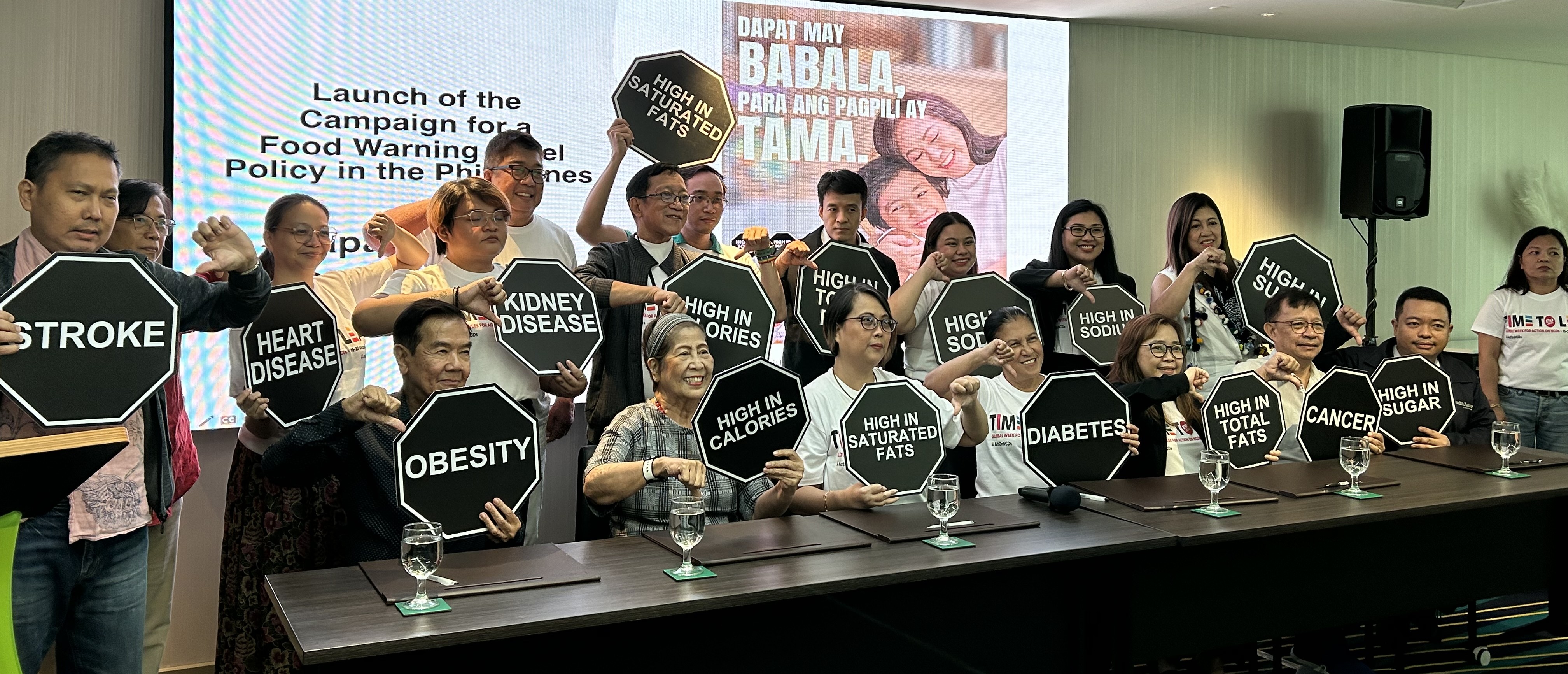Health orgs, experts push for food warning label policy to beat NCDs

In order to decrease the consumption of ultra-processed food and to combat non-communicable diseases (NCDs), health organizations and experts called on the national government on Wednesday to implement a policy for food warning labels.
At a press conference, Healthy Philippines Alliance made the call during the signing of a memorandum of understanding to formalize its collective commitment to combat NCDs, in time for the celebration of World Food Day on October 16.
HPA said that food warning labels enable better food choices for Filipinos dealing with crowded, fast-paced purchasing environments.
"This alliance is to address the global epidemic of NCDs. In the Philippines, cardiovascular diseases (34%), chronic respiratory disease (5%), other NCDs (16%), cancer (11%), and diabetes (4%) are the top causes of mortality and morbidity," said former Health secretary and HPA lead convenor Dr. Jaime Galvez Tan.
He cited a World Health Organization (WHO) report that the country recorded 70% or 622,232 deaths due to NCDs.
"We are facing an alarming rise in childhood obesity, as well as cardiovascular diseases, which are the leading killers in the Philippines," Tan said, citing another survey from the National Nutrition Survey that 40.2% of Filipino adults aged between 20 and 59 years old are overweight or obese.
Why do we need food warning labels?
Tan said that "our unhealthy food environment dominated by ultra-processed foods is failing us."
He said that without proper regulation, such as a policy to implement food warning labels, this would continue to contribute to the NCD burden and poor health of Filipinos.
"NCDs threaten the quality of life of every Filipino, young or senior. Our policymakers and legislators must accelerate strategies to mitigate unhealthy diets and NCDs. We can help every Filipino and even every child choose healthier food options," he added.
Currently, only mandatory back-of-pack nutrition facts and voluntary front-of-pack labeling (FOPL) practices exist in the Philippines. However, according to the organization, this 'ineffectively informs or educates Filipino consumers to make healthier choices.'
The HPA then noted growing evidence that food warning labels, compared to other kinds of front-of-pack labeling schemes, more effectively discourage consumers from purchasing unhealthy food or drinks.
A Social Weather Stations nationwide survey in March 2024 showed that 62% or 6 out of 10 Filipinos say food warning labels, referring to the black octagonal warning labels, most clearly indicate health risks in the food and beverage products versus other FOPL schemes.
The survey said 66% of Filipinos would support a policy to implement food warning labels.
"Ang pinopropose talaga na batas ay makita agad 'yung warning label, black siya. Tapos computed na, hindi na mag-iisip 'yung mamimili kasi nakalagay na. Kung ilan ang sodium, sugar, salt," said HPA representative Ma. Fatima Villena, who also sits as a board of trustee at The Police Center Philippines.
(What is being proposed is to immediately see the warning label, it is black in color. It is already computed so the buyer won't have to think about it because it's already there. How much sodium, sugar, salt are in their food.)
‘Healthier food choices’
HPA urged the youth, students, and those living independently to make healthier food choices.
Ralph Degollacion, HealthJustice Philippines managing director, said having warning labels on food items will also benefit people with busy lifestyles, from college students to young adults and those living independently.
“I think for those who have busy lifestyles and those people who are living independently, I must say it's really giving them the right information and a choice to choose — to let them have a better choice among the products that are available,” he said.
“The emphasis here is having healthier and better food choices instead of just getting food without any warning labels and you don't know the content,” he added.
Degollacion pointed out that not everyone is reading the fine print or the mandatory back-of-pack nutrition facts and voluntary front-of-pack labeling (FOPL).
“Kasi sino bang nagbabasa nung fine prints of the warning label. (Because who reads the fine print of the warning label.) Unlike with food warning labels, you already know when you get food that is with a specific nutrient that might not be good for your health. Especially if you have NCD, like diabetes, etc. At least you already know,” he said.
“With a warning label, you can choose what is more appropriate and better for your lifestyle. I know price is another point but again, pagdating sa pagkain, everyone can spend more kapag alam na makakatulong sa lifestyle nila (when it comes to food, everyone can spend more when they know it can help them improve their lifestyle.) That's the basic principle of having a warning label, information,” he further said.
Villena also added that healthy food options are now easier and accessible for everyone.
“Alam mo, gusto ko i-rebut 'yang sinsasabi ng mga bata na mahirap sa mga estudyante dahil walang oras, na mahal kumain ng healthy. Kasi actually ang ano talaga, kailangan lang ay piliin natin kainin 'yung mga natural forms or minimally processed foods,” she said.
(You know, I want to rebut what the kids say that it's hard for students because they don't have time, that it is costly to eat healthy. Because actually we just have to choose to eat food in their natural form or minimally processed foods.)
She added that more young people are now choosing to improve their health, whether by having a balanced diet or being physically active.
The MOU signing was also graced by Education Assistant Secretary Dexter Galban, Pusong Pinoy Party-List Representative Jett Nisay, and Health Justice Managing Director Ralph Degollacion, among others.—AOL, GMA Integrated News




